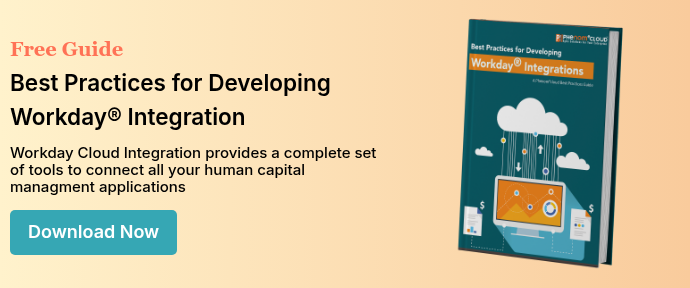
For years, one factor that drove many organizations to seek a single vendor for all their enterprise platforms has been the difficulty of integrating disparate systems. The complexity of integrations has been beyond the budgets and capability of many companies. Diffusion of web services expertise and standardization of practices has reduced integration costs data exchange remains a significant drain on resources.
Until recently, the solution was expensive and complex middleware, but cloud providers like Workday® have stepped up to bring integrations within the reach of enterprises of all sizes.
Workday® Cloud Integration
Workday® has created a complete integration service for its customers, providing an integration platform as a service (IPaaS) on its cloud platform. It accomplishes this with convenient services in a single enterprise services bus.
Workday® provides four types of services in its cloud platform:
- Pre-built connectors designed and maintained by Workday® and its partners. The companies work together to maintain and evolve the connectors on their regular update schedule, so customers are always assured of a stable, up-to-date connection.
- Toolkits that make integrations easier when a connector does not exist. For example, the Cloud Connect kit for 3rd Party Payroll makes is easy to connect to any payroll service.
- Enterprise Interface Builder (EIB) consists of configurable data extraction, transformation, and transports in a user-friendly form-based graphical interface for business users and analysts.
- Workday® Studio is at the opposite end of the spectrum. The studio is a graphical developer tool for building sophisticated data integrations and transformations.
EIB, the Tool of Choice
The tool most used by Workday® customers is the Enterprise Interface Builder. It doesn’t require programming and is available in Workday® applications. Customer IT groups and developers use it when they do not need more sophisticated data manipulation.
- Users can run processes to export data on a schedule or as a one-time data transfer and can aggregate large numbers of tasks. They can also load large data sets into Workday® using Excel spreadsheets.
- Transports include SFTP, email, WebDav, SOAP, and REST. It also provides a proprietary Workday® Attachment transport. For FTP, EIB provides data security with PGP encryption and digital signatures.
- EIB can perform data transformations with both XSLT and Visual Transformer for fixed-width outbound files. Data formats include XML, Excel, CSV, JSON, GData, and RSS besides HTML.
- File compression is available.
- EIB has a filename sequence generator for multi-file jobs.
Limitations
When you use EIB, you need to know about these constraints.
- You can attach files at runtime, but it has a 5MB limit. SFTP can handle files up to 300MB.
- EIB does not have an error handling capability, but you can use the error handling in web services.
- Only one data source and one destination are allowed.
Workday® Enterprise Interface Builder will handle most data integrations, and the tool is much easier to use than a development platform. We appreciate that Workday® helps keep things simple.
PhenomᵉCloud is a comprehensive technology solutions provider committed to empowering businesses to overcome challenges, enhance their workforce capabilities, and achieve superior outcomes.


Leave a Comment